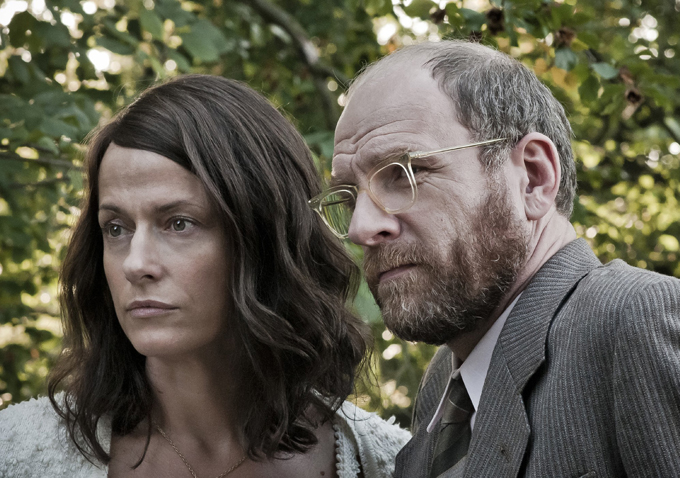 Most films about The German Democratic Republic, commonly known as East Germany, tend to be in the spy thriller variety. This makes sense, since bureaucratic backstabbing and political paranoia were more readily available than food and water behind The Iron Curtain during its heyday.
Most films about The German Democratic Republic, commonly known as East Germany, tend to be in the spy thriller variety. This makes sense, since bureaucratic backstabbing and political paranoia were more readily available than food and water behind The Iron Curtain during its heyday.
Masterful genre-bending works like 1965’s immensely influential John le Carré adaptation “The Spy Who Came in from the Cold” and 2006’s Best Foreign Language Film Oscar winner “The Lives of Others” took full advantage of a bleak society where even the most close-knit families couldn’t fully trust one another in order to create truly immersive and unpredictable mysteries.

Based on Uwe Tellkamp’s novel “The Tower: Tales from a Vanished Land”, a positively reviewed best seller in Germany, “The Tower” is a two-part mini-series that attempts to bring an original angle to a story about The GDP.
By electing to present a drama instead of a spy thriller about the day-to-day lives of an East German family living in Dresden during the 80s, which happened to be the country’s last decade before The Berlin Wall came crashing down, “The Tower” attempts to put more of a human face on the many struggles of life behind The Iron Curtain. Imagine a less cinematically successful, emotionally impactful, yet serviceable made-for-TV version of “The Lives of Others” that only focuses on the family that Ulrich Muhe’s sneaky surveillance officer spied on, and you pretty know what to expect from “The Tower.”

Richard Hoffman (Jan Josef Liefers) is a doctor who clearly doesn’t respect the state’s authority as much as the state would like him to, which might endanger his possible upcoming promotion as the head of the hospital. His wife Anne (Claudia Michelsen) harbors thoughts of revolting against the establishment but struggles to keep her head down for the sake of his husband’s career.
Their son Christian (Sebastian Urzendowski) is an avowed academic and intellectual, whose curiosity for banned literature forces him on the path of a soldier’s life, away from his studies, where any form of individuality will be beaten out of him. As the years pass and The GDP comes closer and closer to complete disintegration, the family drifts further apart as the state-sanctioned mistrust and cynicism eats them from the inside out.

Directed by Christian Schwochow, who seems to work equally for the big and the small screen, “The Tower” shines when it’s called upon to satirize life in East Germany. Even the low-profile citizens like the Hoffman family have to jump through many hoops, some painful, some absurd, in order to survive or to perhaps enjoy life every now and then.
The mini-series opens with an amusing sequence depicting Richard and his friends giddily stealing a Christmas tree specifically grown for a state leader they all hate. A bit of a People’s Front of Judea vs. Judean People’s Front situation occurs when another pack of drunk intellectuals show up to steal the same tree. During dinner, the family tries to think of positive things like rainbows and butterflies while yelling out the word “Socialism!” as a last-ditch attempt to reprogram the word in their minds as something remotely positive.

The soldiers at Christian’s military academy employ a harsher version of the same strategy as they dunk an underperforming soldier’s face into a bowl full of feces. “That’s socialism for you”, one of them says, “You make them eat shit until it tastes like chocolate.” Such acute and biting observations about the oppressive world the characters inhabit are what elevate “The Tower” into something more memorable than it perhaps deserves.
The problems begin with story elements that have nothing to do with state politics, but ones that attempt to create universal human drama. The rift that takes place within the Hoffman family because of outside political forces they can’t control is a tragedy. However, the family dysfunction that arises from soap opera-level cliché conflicts really hurt the mini-series’ dramatic credibility.

For example, one of the most prevalent sub-plots (It even provides the series’ only end-of-episode cliffhanger) revolves around Richard’s Don Draper-style narcissistic double life, where he has a mistress and even a daughter he keeps secret from everyone else. This story falls into every pitfall of predictable TV melodrama.
Another romance developing between Christian and a fellow classmate is executed poorly, since they jump from barely knowing each other to proclaiming eternal love for each other within two short sequences. It feels like at least four or five scenes are missing in between.

Some visual touches and lines that are too on-the-nose might also leave a bitter taste in the viewer’s mouths. As Christian finally rebels against the abusive soldiers after a tragic death in his platoon, he screams out “This could only happen in this shitty system!” It’s painful to even mention the fact that the eventual liberation of East German citizens is punctuated with a shot as shamelessly pandering as that of birds flying freely into the horizon.
Pacing is another major issue with “The Tower.” Part One takes place completely during the last couple of weeks of 1982 and employs a fairly loose and slow pace that could have easily picked up during a couple of dull spots. Part Two, on the other hand, attempts to cram in almost an entire decade within the same running time as Part One, ending up as a haphazardly constructed conclusion that leaves many important sub-plots hanging while clumsily tying up others.

All in all, "The Tower" is a middle-of-the road kind of dramatic experience. It does a good job depicting the day-to-day struggles of life in The GDP while falling victim to obvious tricks of melodrama and a muddled execution. [C]

